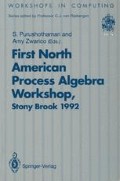Abstract
The total order assumption (TOA) is the assumption that all execution sequences of observable actions or events are totally ordered by precedence. As long as in some cases TOA is to the point, total order and partial order semantics are both legitimate but lead to different theories. I argue that TOA is a simplifying assumption, and present an example of a total order theory without interleaving, and a partial order theory with interleaving.
This paper has also appeared in the Proceedings of the Workshop “What good is interleaving?”, Sheffield, June 1992, University of Hildesheim Technical Report 1992.
Access this chapter
Tax calculation will be finalised at checkout
Purchases are for personal use only
Preview
Unable to display preview. Download preview PDF.
References
J.C.M. Baeten & J.A. Bergstra, Real time process algebra, Formal Aspects of Computing 3 (2), 1991, pp. 142–188.
J.C.M. Baeten & J.A. Bergstra, Real space process algebra, in: Proc. CONCUR’91, Amsterdam (J.C.M. Baeten & J.F. Groote, eds.), Springer LNCS 527, 1991, pp. 96–110.
J.C.M. Baeten & J.A. Bergstra, Asynchronous communication in real space process algebra, in: Proc. Formal Techniques in Real-Time and Fault-Tolerant Systems, Nijmegen 1992 (J. Vytopil, ed.), Springer LNCS 571, 1991, pp. 473–492.
J.C.M. Baeten, J.A. Bergstra & S.A. SMOLKA, Axiomatizing probabilistic processes: ACP with generative probabilities, in: Proc. CONCUR’92, Stony Brook (W.R. Cleaveland, ed.), Springer LNCS 630, 1992, pp. 472–485.
J.C.M. Baeten & W.P. Wegland, Process algebra, Cambridge Tracts in Theor. Comp. Sci. 18, Cambridge University Press 1990.
J.A. Bergstra & J.W. Klop, Verification of an alternating bit protocol by means of process algebra, in: Math. Methods of Spec. and Synthesis of Software Systems ‘85 (W. Bibel & K.P. Jantke, eds.), Springer LNCS 215, 1986, pp. 9–23.
ESP92] J. Esparza, Fast model checking using partial order semantics, to appear in: Proc. Workshop “What good is partial order”, Sheffield, Technical Report, University of Hildesheim 1992.
W.J. Fokkink & A.S. Klusener, Real time process algebra with prefixed integration, report CS-R9219, CWI Amsterdam 1992.
J.C. Godskesen & K.G. Larsen, Real-time calculi and expansion theorems, report, Aalborg University 1992.
C.A.R. Hoare, Communicating sequential processes, Prentice Hall 1985.
A.S. Klusener, Completeness in real time process algebra, in: Proc. CONCUR’91, Amsterdam (J.C.M. Baeten & J.F. Groote, eds.), Springer LNCS 527, 1991, pp. 376–392.
R. Milner, Communication and concurrency, Prentice Hall 1989.
F. Moller & C. Tofts, A temporal calculus of communicating systems, report LFCS-89–104, University of Edinburgh 1989.
F. Moller & C. Tofts, A temporal calculus of communicating systems, in: Proc. CONCUR’90, Amsterdam (J.C.M. Baeten & J.W. Klop, eds.), Springer LNCS 458, 1990, pp. 401–415.
Nicollin, J. Sifakis & S. Yovine, From ATP to timed graphs and hybrid systems, in: Proc. REX Workshop on Real Time: Theory in Practice, Mook 1991 (J.W. de Bakker, C. Huizing, W.P. de Roever & G. Rozenberg, eds.), Springer LNCS 600, 1992, pp. 549–572.
W. Reisig, Petri nets, Eatcs monograph on TCS, Springer Verlag 1985.
Wang YI, Real-time behaviour of asynchronous agents,in: Proc. CONCUR’90, Amsterdam (J.C.M. Baeten & J.W. Klop, eds.), Springer LNCS 458, 1990, pp. 502–520.
G. Winskel, Event structures, in: Petri nets: applications and relationships to other models of concurrency, Bad Honnef 1986 (W. Brauer, W. Reisig & G. Rozenberg, eds.), Springer LNCS 255, 1987, pp. 325–392.
Author information
Authors and Affiliations
Editor information
Editors and Affiliations
Rights and permissions
Copyright information
© 1993 British Computer Society
About this paper
Cite this paper
Baeten, J.C.M. (1993). The Total Order Assumption. In: Purushothaman, S., Zwarico, A. (eds) NAPAW 92. Workshops in Computing. Springer, London. https://doi.org/10.1007/978-1-4471-3217-2_14
Download citation
DOI: https://doi.org/10.1007/978-1-4471-3217-2_14
Publisher Name: Springer, London
Print ISBN: 978-3-540-19822-2
Online ISBN: 978-1-4471-3217-2
eBook Packages: Springer Book Archive

